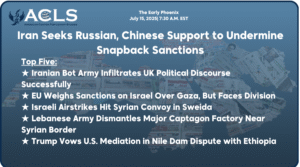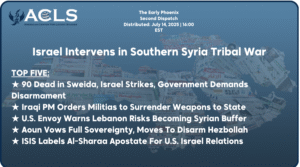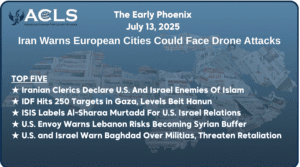TOP HEADLINES:
- Hamas Official Says Group Could Disarm in Exchange for Two-State Solution
- ICC Considers Arrest Warrants for Senior Israeli Officials–with Apparent U.S. Concurrence
- Nuclear Weapons Debate Triggers Sharp Criticism in Iran
- Baghdad and Erbil May Agree to Postpone Kurdistan Elections
- Qatar to Host Global Meeting on Ukrainian Peace Proposal
=======================
★ ISRAEL & PALESTINIAN TERRITORIES
Senior Hamas Official Says Group is Open to Disarming for a Two-State Solution
Khalil al-Hayya, a senior Hamas official, stated that Hamas is ready to lay down its arms and transform into a political party if a fully sovereign Palestinian state is established along the pre-1967 borders. In an interview, Al-Hayya expressed that the militant group, which still officially aims to eliminate Israel, would agree to a five-year truce and dissolve its military wing under these conditions. He emphasized the group’s desire to join the Palestine Liberation Organization to form a unified Palestinian government, advocating for the rights and statehood of the Palestinian people.
Israel to Proceed with Rafah Operation to Pressure Hamas
According to Israel’s “Yedioth Ahronoth” newspaper, Prime Minister Benjamin Netanyahu’s government is advancing a ground operation in Rafah, the southernmost part of the Gaza Strip, to coerce Hamas into resuming prisoner exchange negotiations. The Israeli security cabinet is convening today to discuss this and other matters, with the military pushing for the green light to proceed with the operation aimed at dismantling Hamas’s capabilities in the area.
Hamas Commander Sinwar Emerges from Tunnels to Make Public Appearance in Gaza
Yahya Sinwar, leader of Hamas in Gaza, was seen publicly in Gaza, contradicting Israeli claims of his isolation. According to a Hamas official, Sinwar inspected conflict sites and met with fighters, actively leading from the ground rather than from tunnels. Hamas said this appearance challenges Israel’s narrative of Sinwar’s disconnection from his forces and highlights ongoing operational command within Hamas.
U.S. Wants Answers from Israel on Reported Mass Graves in Gaza
The United States has called for Israel to provide “answers” regarding reports of mass graves found at two major hospitals in Gaza. According to Gaza’s Civil Defense, approximately 340 bodies were uncovered at Nasser Hospital in Khan Younis, with Hamas alleging they were killed by Israeli forces. Additionally, about 30 bodies were reported in mass graves at Shifa Hospital in Gaza City. U.S. National Security Advisor Jake Sullivan emphasized the need for a thorough and transparent investigation into these reports, a sentiment echoed by the United Nations and the European Union.
ICC Considers Arrest Warrants for Senior Israeli Officials–with Apparent U.S. Concurrence
Reports indicate the International Criminal Court (ICC), with apparent U.S. approval, is contemplating arrest warrants against senior Israeli officials. The consideration follows the Palestinian Authority’s acceptance of ICC jurisdiction over alleged crimes by Israel. This development, highlighted by Israeli media, marks a significant tension point in U.S.-Israel relations. ICC Chief Prosecutor Karim Ahmad Khan, supported by the U.S. since 2021, is also recognized for closing other sensitive cases involving the U.S. This action could potentially affect high-ranking Israelis including Prime Minister Benjamin Netanyahu.
Hamas and Fatah Plan Unity Talks in Beijing
In a significant development aimed at Palestinian reconciliation, representatives from Hamas and Fatah are scheduled to meet in Beijing to discuss ending internal divisions. Key figures such as Hamas’s Moussa Abu Marzouk and Fatah’s Azzam al-Ahmad will attend. This meeting follows Hamas leader Khalil al-Hayya’s announcement of the group’s readiness to transform into a political party and accept a five-year truce with Israel, provided a sovereign Palestinian state is established based on 1967 borders.
=======================
★ IRAN
U.S. Imposes New Sanctions on Iran Following Cyber Attacks
The U.S. has announced fresh sanctions on Iran, targeting individuals and companies linked to cybercrimes. The sanctions include two firms, Dadeh Afzar Arman and Mehrsam Andisheh Saz Nik, believed to be fronts for Iran’s Revolutionary Guard cyber command. The targets, mainly defense contractors and other businesses in New York, were attacked through spear phishing and malware from 2016 to 2021, affecting over 202,000 accounts. The move comes as a response to Iran’s cyber operations against more than a dozen U.S. entities.
Escalating Criticism in Iran Over Economic Mismanagement
In Iran, criticism is mounting from politicians, clerics, and media against the government’s handling of the economic crisis, with inflation set to exceed 50%. Ayatollah Abdollah Javadi-Amoli, a significant religious leader, expressed concern over the impact of economic struggles on faith. Reports highlight unaffordable housing and rising food costs unrelated to external factors, but due to poor governmental policies. This dissatisfaction extends to conflicts among Iranian leaders overseeing economic policies that experts and the public charge are ridden with corruption and inefficiency.
Nuclear Weapons Debate Triggers Sharp Criticism in Iran
Ayatollah Ali Khamenei, Iran’s Supreme Leader, has compared U.S. pressures on Iran’s nuclear ambitions to the disarmament of Muammar Gadhafi’s regime in Libya. Khamenei warned that if Iran disarms as Gadhafi did, the Islamic Republic could suffer the same consequences as Gadhafi. His statement comes at a time when Iranians are discussing the implications of developing nuclear weapons if cornered by the regime’s foreign enemies. Many in the Iranian political sphere have expressed opposition to developing nuclear weapons, which they believe would provide Western powers with grounds for increased sanctions. Khamenei criticized those within Iran advocating compliance with U.S. demands, emphasizing that the U.S. intentions are to dismantle Iran’s nuclear capabilities entirely and impose on Tehran the same fate imposed on Gadhafi.
=======================
★ YEMEN
Houthis Target U.S. and Israeli Ships; CENTCOM Intercepts Missile Attack
The Houthis have launched additional missile and drone attacks on American and Israeli vessels in the Gulf of Aden and the Indian Ocean. In response, U.S. Central Command (CENTCOM) reported successfully intercepting a ballistic missile and several drones aimed at coalition ships. These attacks highlight the Houthis’ determination to sustain their threats against U.S. and British naval interests, expanding their operational reach into strategic maritime routes.
Greek Warship Intercepts Houthi Drones in the Red Sea
A Greek naval frigate participating in the European Union’s maritime mission in the Red Sea intercepted two Houthi drones targeting a commercial ship. The Hydra frigate, which was escorting a merchant vessel in the Gulf of Aden, successfully destroyed one drone and repelled another. This defensive action is part of the EU’s efforts, initiated in February, to protect key maritime trade routes from Houthi drone and missile attacks, which the Houthis claim are in retaliation to Israel’s ongoing conflict in Gaza.
=======================
★ IRAQ
Iraq Reportedly Gave Turkey Green Light to Attack PKK in Exchange for Water Rights
Iraq reportedly has authorized Turkey to conduct military operations against PKK strongholds in Northern Iraq’s Kurdistan region, in exchange for an agreement on water rights from the Tigris and Euphrates rivers. The deal was reached during Turkish President Erdogan’s visit to Iraq, marking the first of its kind in over a decade. The operations are to be carried out in uninhabited areas or regions under PKK control, avoiding civilian zones. This strategic agreement also includes commitments on water management, security collaboration, and broader economic and developmental partnerships between the two nations.
Iran-Aligned Shi’a Parties Oppose Iraq’s Engagement in Turkey’s Conflict with PKK
Iraqi Shiite groups have voiced strong opposition to the Iraqi government’s potential involvement in Turkey’s ongoing conflict with the Kurdistan Workers’ Party (PKK). These groups, influential in Iraq’s political and security landscapes, oppose Ankara’s push for military cooperation, fearing it could drag Iraq into an external conflict. Despite recent economic and developmental agreements between Turkey and Iraq, security cooperation remains a contentious issue, with significant pushback from factions closely aligned with Iran, wary of Turkey’s increasing influence in Iraq.
Baghdad and Erbil May Agree to Postpone Kurdistan Parliament Elections
Iraqi sources from Baghdad and Erbil have confirmed preliminary agreements to delay the Kurdistan parliament elections scheduled for June 10. This decision follows discussions between Kurdish and Baghdad officials, with the Kurdistan Democratic Party having announced it would boycott the June 10 elections due to unprecedented electoral changes mandated by Iraq’s Federal Supreme Court, including a reduction of parliamentary quotas for minorities and the striking of hundreds of thousands of Kurdish citizens from the voter rolls. High-level visits and meetings between Baghdad and Erbil are expected to continue, addressing not only the elections but also shared concerns including oil exports and regional governance.
After Meeting Erdogan, Sunni Blocs in Iraq Move to Form Unified Coalition
Iraqi Sunni political blocs are set to establish a unified coalition to enhance their political representation, following a meeting with Turkish President Recep Tayyip Erdoğan in Baghdad. The coalition aims to consolidate Sunni parties and potentially increase their influence in upcoming legislative elections. Full details of the coalition’s political project reportedly will be announced soon, with Erdoğan’s support.
Iraq Partners with Ukrainian Firm to Increase Anbar Gas Production
Iraq has signed a development contract with Ukrainian company Ukrzemresurs to increase the production capabilities of the Akkas gas field in Anbar governorate. This agreement, previously held by Korea Gas Corporation, aims to boost gas output from 60 million cubic feet per day to 400 million within four years. The initiative highlights Iraq’s commitment to enhancing its energy sector, leveraging the field’s substantial reserves of 5.6 trillion cubic feet of natural gas discovered in 1992.
=======================
★ SYRIA
Iran Reportedly Reduces Military Presence in Southern Syria After Israeli Strikes
According to Agence France-Presse, Iran has reduced its military presence in southern Syria, pulling back forces including high-ranking officials following Israeli airstrikes. An unnamed source linked to Hezbollah stated that Iranian forces evacuated southern regions and will limit themselves to a representative office in Damascus for coordination with Syrian allies. This move follows significant Israeli strikes, notably a January 20th attack that killed five Revolutionary Guard members in Damascus, prompting Iran to reconsider its troop deployments in vulnerable areas.
U.S. Condemns Attack on Kurdish Democratic Party Offices in Qamishli
The United States has condemned an arson attack on the offices of the Kurdish Democratic Party in Qamishli, urging all parties in the northeast to engage in constructive dialogue to meet the aspirations of the Syrian people. The U.S. Embassy in Syria, via the X platform, called for an end to attacks on political parties in northern Syria and accountability for those responsible. The attack, executed by the Revolutionary Youth Organization affiliated with the PKK, targeted three headquarters of the Kurdish National Council in Hasakah province, Northeast Syria, following ongoing detentions of local university students by Syrian security forces.
=======================
★ GULF REGION
Kuwait is Unhappy with Iraq’s Development Corridor Initiative
Kuwait has reacted strongly against the signing of the Development Corridor Memorandum of Understanding between Iraq, Qatar, the UAE, and Turkey. The project, set to enhance connections between Iraq and the Gulf through Turkey, begins at Iraq’s Al Faw Port, adjacent to Kuwait’s struggling Mubarak Port. Over a third of Kuwait’s parliament members have criticized the government’s lag in developing its own ports, viewing the corridor as a threat to national economic and trade interests. They urge immediate action to complete Mubarak Port and investigate the delay’s impact on Kuwait’s interests.
Qatar to Host Global Meeting on Ukrainian Peace Proposal
Qatar is set to host a key gathering of national security advisors and senior officials worldwide in Doha to discuss a Ukrainian proposal aimed at settling the conflict with Russia. The discussions are part of preparatory talks leading to a high-level summit scheduled in Switzerland in June. The Doha meeting will involve participants from the G7 and the Global South, setting the stage for broader peace negotiations.
Qatar Delivered Recording of Israeli-American Prisoner to the U.S. Before Public Release
Qatar handed over a video recording of Hersh Goldberg Bolin, an Israeli prisoner with U.S. citizenship held by Hamas, to the U.S. government last Monday, as reported by Axios. The issue was discussed in calls between Qatar’s Foreign Minister Sheikh Mohammed bin Abdulrahman Al-Thani and U.S. Secretary of State Antony Blinken, alongside senior White House officials. The recording was part of Qatar’s efforts to facilitate an exchange deal and served as proof of life.
=======================
★ EGYPT AND NORTH AFRICA
Egypt Approves Free Zone and Tourist Port in Ras Al-Hikma
The Egyptian Cabinet has approved the establishment of a specialized free zone and an international tourist port in Ras Al-Hikma, west of Alexandria. Named the “Ras Al-Hikma Urban Development Company,” the project was initiated in collaboration with Abu Dhabi Holding with a development contract worth $35 billion signed in February. Egypt’s government also formed a ministerial committee to expedite the project, which includes industrial, commercial, and financial zones, enhancing the country’s economic prospects.
Egypt Warns of Tensions if Israeli Pressure at Gaza Border Continues
Egypt’s Foreign Ministry spokesman, Ahmed Abu Zeid, expressed concerns over attempts to increase pressure on Palestinians near the Egyptian border, warning that such actions could strain relations with Israel. In a televised interview, Abu Zeid emphasized mechanisms in place to address any breaches of the 1979 peace agreement between Egypt and Israel. He also highlighted international opposition to military operations in Rafah, indicating that the area could not withstand further escalation or humanitarian suffering.
Egyptian Debt Issuance Surges to $71.6 Billion This Year
Egypt has issued $71.6 billion in debt instruments since the start of 2024, marking a 57% increase from last year, according to Bloomberg. This surge includes $69.2 billion in local currency bonds, the highest level since at least 2013. Egypt’s finance minister, Mohamed Maait, confirmed the country’s target to raise the average maturity of its debt to between 4.5 to 5 years. The rise in debt issuance aligns with Egypt’s efforts to meet a substantial financing need of 2.14 trillion Egyptian pounds for the fiscal year.
=======================
★ TURKIYE
Arab States Reportedly Rejected Turkish Proposal for Arab Troops in Gaza and West Bank
Turkey proposed a security arrangement involving Arab states during the initial stages of the Israel-Hamas war, but faced rejection from countries including Egypt. According to Kan News, this plan included presenting a security strategy to the U.S. and Israel, potentially involving Arab forces in Gaza and the West Bank as part of a two-state solution. Despite Turkey’s attempts to influence the Palestinian arena and replace Qatar as a key mediator, Arab nations remain skeptical of Turkey’s motives, viewing its efforts with caution.
Turkey Keeps Interest Rate Unchanged at 50% Despite Rise in Inflation
Turkey’s Central Bank has decided to keep its key interest rate steady at 50%, following last month’s significant 500 basis points increase from 45%. This decision was made despite the country’s annual inflation rate escalating to 67.07% in March, with consumer prices rising by 3.16% from February. The Bank, expressing concern over inflation risks, chose to maintain the rate to assess the effects of recent monetary policy tightening. This approach aligns with efforts to manage the ongoing cost-of-living crisis, with inflation expected to peak in May before it begins to recede.
=======================
📌 Incase you missed it,
📰 THE EARLY PHOENIX April 24 , 2024
📰 THE EARLY PHOENIX April 23 , 2024
📰 THE EARLY PHOENIX April 22 , 2024
🔗 Follow the latest news from the American Center for Levant Studies via Google News



